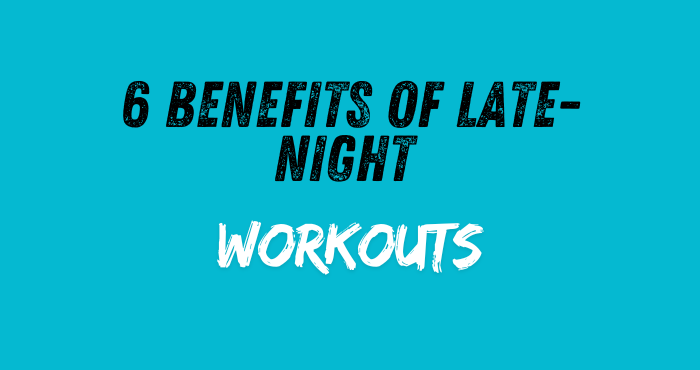Regular workouts are a cornerstone of a healthy lifestyle. Not only can they lower the risk of various chronic conditions such as diabetes, but they also help manage them. Whether you choose to exercise in the morning, during the day, or at night is up to you. Since late-night workouts are usually overlooked, this post aims to shed light on six critical benefits they provide.
- Better blood sugar control
A study published in the November 2022 issue of Diabetologia found that afternoon and evening workouts can help regulate blood sugar levels. More specifically, exercising between noon and midnight may reduce insulin resistance more effectively than activity earlier in the day. Exercising in the afternoon reduced insulin resistance by 18%, whereas exercising at night reduced it by 25%.
Further studies are necessary to uncover the mechanisms through which the timing of workouts influences blood sugar control. One theory is that the timing of physical activity enhances the circadian rhythm and improves metabolic health.
Previous research on this subject showed similar results. Researchers from Australia found that evening workouts boost metabolism and make it easier to regulate overnight blood glucose levels.
If you have diabetes or you’re at a higher risk of developing this metabolic condition and want to prevent it, late-night workouts could be beneficial.
- Increased muscle strength
If your main purpose in workouts is to get stronger, you may benefit from late-night workouts. Evidence shows peak muscle performance is in the afternoon and evening. That happens due to changes in core temperature and hormone levels.
Muscles in your body tend to be weaker in the morning. Their strength gradually increases during the day. That’s why the peak strength is in the evening, which means you can gain more benefits with your workouts. You can expect muscle strength to go up.
- Better sleep
Most people don’t get enough sleep, which can increase stress, lower energy levels, and contribute to or worsen various health problems, including diabetes. Physical activity is a good option to promote sleep, even if you exercise later at night.
After reviewing evidence on this subject, researchers found that not only did evening exercise not affect sleep, but it actually helped people sleep better. People were able to fall asleep faster and enjoy a better quality of sleep after an evening workout. These benefits don’t apply to high-intensity workouts. So, if you want to exercise later at night for better sleep, try avoiding vigorous activities.
Keep in mind that good quality of sleep isn’t just about the timing of the workouts. It’s imperative to get between seven and nine hours of sleep every night, preferably with a strict sleep schedule. That means you should go to bed and wake up at the same time every day. Turn off devices and eliminate all distractions.
- Stress management
Stress is a significant problem for millions of people worldwide. While a normal reaction to stressful or uncomfortable stimuli, stress worsens physical and mental health when left unmanaged. For example, chronic stress suppresses glucose uptake, negatively affects glucose metabolism, impairs insulin secretion, and inflicts insulin resistance and inflammation. More precisely, stress may make it tricky to manage diabetes. It can also aggravate the management of other chronic conditions.
Regular exercise is an excellent way to manage stress. Late-night workouts are beneficial for people who had a difficult day and want to relieve stress before going to bed. As you push yourself during a workout, you also take off the burden that troubled you during the day. Late-night exercise, whether at home or the gym, is a convenient strategy to let go of frustrations.
- Increased focus
Working out in the morning or during the day isn’t always stress-free, especially if you’re a gym member. Other people can be distracting, especially if they happen to use the same equipment you want. Then you need to wait your turn and do something else instead.
Plus, as you chat with other gym-goers, you lose precious time. All this happens because you’re not focused. Since your focus is reduced, you can’t get the maximum results. One way to avoid this problem is to work out later at night. Chances are there won’t be too many people in the gym so you can focus on yourself, the equipment, and your workout.
- Better overall performance
Some people may find their morning workouts aren’t as efficient as they’d like. This isn’t just a feeling, though. Your performance may be better at night. Not only because muscles are stronger (as seen above), but also because you’re more flexible. In the morning muscles and joints are stiffer. You need to warm up properly and thoroughly to avoid injuries.
While warm-ups are always a good thing, regardless of the timing of physical activity, you may find late-night workouts give better results. You also have more endurance and energy to invest in the exercises.
Useful late-night workout tips
To get the most from your late-night workouts, you may want to give these tips a try:
- Prioritize full-body movements rather than cardio
- Plan your workout during the day
- Eat most of your calories for breakfast
- Maintain a balanced diet during the day
- Stay hydrated, prioritize water instead of sugar-laden beverages
- Build consistency by sticking to your routine
- Start with a gentle warm-up
- Experiment with different workouts and types of training to find what works for you best
Conclusion
Regular workouts improve our overall health and well-being in many ways. Late-night exercises aren’t an exception. The benefits of late-night workouts range from better blood sugar control to improved sleep, increased muscle strength, more effective stress management, and more. Yet another reason to exercise later at night is that you have access to all the gym equipment and can focus better. It’s essential to do the workout, regardless of the timing, and a routine to improve your health and overall quality of life.

